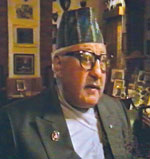 Now we've reached a situation where we're either with the Maoists or against. Which option looks more feasible?
Now we've reached a situation where we're either with the Maoists or against. Which option looks more feasible? It was fine to think about elections, with Maoists participating, as long as the government had not declared them "terrorists" and sent the army after them. Now the situation is different. They have to either surrender or surrender their weapons and ask for the people's pardon. That would make legal sense and, if they come to elections, that could lead to a solution. But who says they can continue terrorist activities, kill security personnel and ordinary people and destroy public infrastructure, and still be brought to join the mainstream during elections? I would not agree to that if I were in the army. Which top politician has been killed? What, does this country only belong to the politicians and not to the people also? The people are dying to save this political system, security forces are being killed, but our society does not seem to recognise that, and wants to bring those who want to destroy this political system into electoral politics. You're worried more about those who want to destroy the system, rather than about those who are fighting to save it? The day we agree to bring them into the election process, we have to free all the murderers and dacoits from the prisons. How can the state function when all criminals are freed? At one time they [the Maoists] were given the benefit of doubt.
So you don't see a peaceful resolution of the Maoist problem? They need to be crushed?
Absolutely. I think justice needs to be done. There must be rule of law in the country. Today if you give them a little space and pardon them, then tomorrow new Maoists will be born. If the government keeps yielding to a force that continues to murder and spread violence, the present problem may be resolved, but what stops another group from doing the same thing tomorrow? They will again force the government to yield. For the sake of stability, we must not create a situation where the government would be forced to yield [to such tactics] repeatedly..
One way to neutralise the Maoists is by assimilating them into the political mainstream, yet you are talking about elimination.
You don't eliminate them or make them ineffective through the use of weapons only. Once you remove its teeth and claws, a tiger becomes harmless, as do snakes whose venom is extracted. [How can] you talk about bringing into the political mainstream those that want to change what has been said to be unchangeable in the constitution, those who want a secular state, those who want an end to the monarchy, those who want a constituent assembly, those who do not want multiparty democracy? Let them fight-forever-that is what happens in wars. Otherwise we would not have world wars; this is a small conflict. The army has not used half of its arsenal. In all those world wars, peace agreements were signed only after defeat or victory. What is the need to give up the rule of law and bring them into the mainstream? That cannot be. No government must do that. Why should we allow in a snake that could eat us in future?
So the state of emergency and military operations must continue. For how long?
We cannot say how long it will take. An internal rebellion is one of the most difficult operations for an army, because the enemy cannot be identified. External enemies can be identified easily. Much has been brought under control after the Royal Nepal Army went out onto the field. Now we don't have to hear of attacks like those in Dang and Mangalsen. The army has spoken about being in control and having broken into the intelligence networks of the Maoists. At this rate, if the Maoists don't get the support of foreign countries, the problem will be resolved soon.
Have we reached a situation that demands direct rule of the king for a certain period?
Yes, we need direct rule now. Not only me, even people living in the US say that the constitution should be handed over to the king-let him rule. The constitution provides that space, only it has to be ratified by parliament within six months. If parliament adds that timeframe, it could continue for as long as five years. If that is done and the right things happen, it is impossible that the king's rule will not be ratified. Many intellectuals have also been thinking along these lines.


